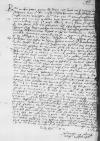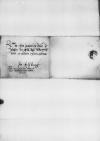Cum ad diem 26 Iunii ea, quae novissima sessione, videlicet secunda die eiusdem mensis, ⌊Bononiae⌋ acta fuissent, sufficienter scripsissem Reverendissimae Dominationi Vestrae una cum transmissione decreti per me tunc publice lecti, parum postea communicandum occurrebat, nisi quod post illum diem fere singulo quoque die factae sunt vel pontificum, vel theologorum aut utrorumque continue super dogmatibus ac moribus congregationes tantumque laboraverant legati et episcopi, ac doctores in discutiendis hereticorum erroribus, ut, si in proxima futura sessione, quae 15 Septembris constituta est, ex omni dispersionis loco congregati fuerint episcopi, pulchra erit sessio ac digna perpetuae memoriae et recordationis. Sola difficultas penes ⌊Hispaniarum⌋ praesules, qui ⌊Tridenti⌋ remanent, persistit, an venturi sint ad ⌊Bononiam⌋ vel ne, immo etiam de ⌊Galliarum⌋ episcopis, qui et a principio apertionis ⌊concilii⌋ ⌊Tridenti⌋ fuerunt et adhuc in vicinis urbibus causa solacii distinctis tamen locis manent.
In Maio litterae a Gallorum novo ⌊rege⌋ ad ⌊pontificem⌋ et cardinales ac ⌊concilii⌋ legatos allate sunt, quomodo iussu eiusdem novi regis et presules, et doctores theologie illico ad ⌊Bononiam⌋ erant venturi, sed neque in hodiernum diem volare aut serpere visi sunt, adeo plena sunt omnia inanium promissionum. In principio sequentis mensis me Deo volente deductis negotiis meis recipiam in ⌊Bononiam⌋ sequarque ⌊concilium⌋ sive ad finem accelerandum, sive ad Sanctum Iohannem in Laterano transferendum, quis tamen exitus erit, curabo, ut brevius, quomodo fieri poterit, intelliget Reverendissima Dominatio Vestra, licet dubium sit mihi, an umquam litterae pervenerint ad manus Vestras. Principio Martii supra 7 epistolas scripseram et ⌊Cracoviensi⌋, et Dominationi Vestrae, sed ad nullum earum receperam responsum, in quo satis miror, cum de ⌊Cracovia⌋ omni septimana huc vel ⌊Padvam⌋, vel ⌊Romam⌋ novi recentesque accedunt viatores.
Providi senes plurimum timent acre bellum in proximo ⌊Italiae⌋ affuturum. Iam inter ⌊Gallum⌋ et ⌊Anglum⌋ hostilitas aperta famatur. Indutiae quadriennales inter ⌊caesarem⌋ et ⌊Turcham⌋ positae sunt condicione tamen adiecta, quod ⌊Gallum⌋ aut ⌊Venetos⌋ caesar ipse non tangat. Fertur etiam pacem perpetuam inter ⌊Romanorum regem⌋ et eundem ⌊Turcham⌋ firmatam fore. Quid autem sit de hac mundiali pace, Deus omnipotens det nobis suam pacem.
Noster ⌊Hannovius⌋ ⌊Romae⌋ bene valens adhuc cum ⌊hydra⌋ certat vix in brevi Romam, prout libenter vellet, egressurus. Iam complevit exercitium suum octennale, si plus tardabit, ibidem superabit ⌊Ulixem⌋.
Felicissime valeat Reverendissima Dominatio Vestra cum omnibus amicis suis.


 AAWO, AB, D. 6, f. 27v
AAWO, AB, D. 6, f. 27v